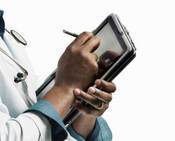Majority Of Patients Want Online Access To DoctorsMajority Of Patients Want Online Access To Doctors
Nearly three-quarters of people want to be able to get lab results, request appointments, pay medical bills, and communicate with their doctor's office through secure portals, finds Intuit Health study.


Health IT Boosts Patient Care, Safety
(click image for larger view)
Slideshow: Health IT Boosts Patient Care, Safety
As a growing number of Americans use the Internet to perform a variety of health-related tasks, a new study shows that nearly three-quarters of those polled say they want the convenience of having an online connection to their doctor's office.
These findings come from Intuit Health's second-annual Health Care Check-Up Survey, which found that 73% of Americans surveyed would use a secure online communication solution to make it easier to get lab results, request appointments, pay medical bills, and communicate with their doctor's office.
Doctors should take note of these trends, particularly since a connected office may determine the number of patients they attend to. The survey also found that almost half of respondents would consider switching doctors to a practice that offered the ability to communicate and complete important healthcare tasks online.
The survey, which was conducted in January by Decipher Research for Intuit Health, polled 1,000 American adults online. The survey confirmed what other studies have shown, that Americans are increasingly turning to the Internet to help them manage various aspects of their healthcare.
Among the findings are:
-- Nearly 20% of Americans feel they cannot easily reach their doctor's office to ask questions, make appointments or obtain lab results.
-- A full 81% would schedule their own appointment via a secure Web service and fill out medical/registration forms online prior to their appointment.
-- A secure online method to access medical histories and share information with their doctor would be used by 78% of respondents.
-- Among Gen Y respondents (born 1965 to 1983), 59% said they would switch doctors for one with better online access, compared to only 29% of Baby Boomers (born 1946 to 1964).

17 Leading EHR Vendors
(click image for larger view)
Slideshow: 17 Leading EHR Vendors
Steve Malik, president and general manager of Intuit Health, said in a statement that patient anxiety is on the rise as they increasingly want to control their health issues, as well as communicate better with their doctor.
"Doctors who offer secure online solutions can meet this patient demand while increasing office efficiency and enhancing the doctor-patient relationship," Malik said. "In addition, online solutions, like a patient portal, have proven to improve staff and patient satisfaction levels, while positively impacting the physician's bottom line by reducing patient no-shows and increasing the speed at which payments are received."
The survey also found that rising costs continue to be a major concern for people, with 70% saying they are somewhat or very concerned about managing their healthcare bills, the same percentage as last year. Healthcare costs increased in 2010 for 62% of respondents, and two-thirds believe their healthcare costs will increase in the future.
Baby Boomers were most concerned with rising costs: 66% said their costs have increased and 72% are most concerned with rising costs in the future. This compares to the 59% of Gen X and Gen Y (born 1984-2002) respondents who said their healthcare costs have increased, and 62% who were concerned with rising costs in the future.
Additionally, the survey provided insights into patients' perspectives on medical bills and payment methods. The survey showed that:
-- Forty-one percent of consumers do not have confidence that the billed amount is correct.
-- One in five is unsure whether to pay their doctor or the insurance company; Gen Y respondents were most unsure whom to pay: 28% versus 8% of Baby Boomers.
-- At least one medical bill has gone to a collection agency for 57%. Women are twice as likely as men to let a medical bill go past due.
-- Forty-five percent of patients wait more than a month to pay their doctor bill, and when they pay, half still send a paper check in the mail.
About the Author
You May Also Like






